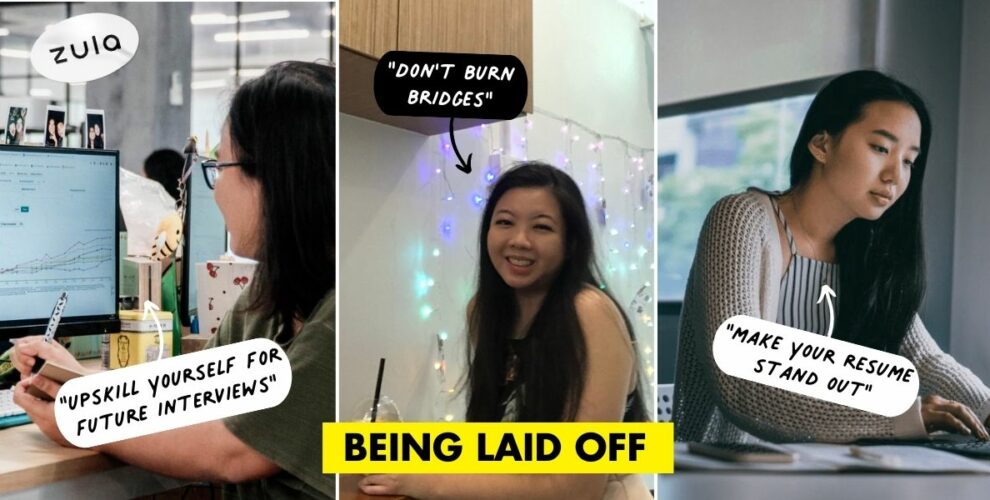Being Laid Off From Work
Clinching your dream job is a big milestone in adulthood. You can finally check that off your post-graduation to-do list, ready to take on the world. But what happens when you get blindsided with a retrenchment? And if recent news reports are anything to go by, plenty of people in the workforce are getting cut.
Retrenchment may be part and parcel of life, but it garners mixed emotions. We spoke to 4 girls in Singapore to share with us their real experiences of being laid off from their jobs and recovery processes, as well as tips to move forward.
Disclaimer: Some names have been altered to protect the identities of our interviewees.
1. “Don’t burn bridges”
 Image courtesy of Rae
Image courtesy of Rae
“My first retrenchment was in 2015 at my first full-time job – a deals marketing platform where I was an editor there. We were told that there would be organisational restructuring taking place soon. My second retrenchment was in 2020, during the peak of COVID-19. I was the deputy editor for a travel magazine, so it wasn’t a surprise that my publication was cut.
During my first retrenchment, I spent more than a week crying. I thought I was a failure. My family and friends were supportive, with many offering to help pay for bills and meals if I needed it. Looking at retrenchment as a break, I spent more time doing things I didn’t get to do like exercising. My second time was sad but I didn’t cry as much. I questioned if I should get out of editorial work, since it seemed to be a pattern.
I spent about 2-3 hours a day applying for jobs and trying to book interviews. I noticed that my skills weren’t relevant anymore, so I put in more time by going for Google and Facebook courses to boost my resume too.
Advice wise, I suggest cancelling all your subscription services and only keep the ones that you use everyday. Additionally, don’t burn bridges. As much as it would be nice to tell your former employers to “suck it”, they might be helpful to you later on. Give yourself a timeline to mope around – after 2 weeks, I started preparing my resumes and sifting through LinkedIn for job opportunities.
Advice for others who have just been laid off from their jobs:
“Set practical goals of what you want to accomplish during this time.”
– Rae, 33
2. “Make your resume stand out by adding colour and design”
 For illustrative purposes only
For illustrative purposes only
“I was a marketing executive and the reasoning the company gave me was that I was unhappy at my work and wasn’t motivated. I was really shocked, angry, and ashamed of myself because I thought I was a failure. I helped myself cope during the notice period by finishing off the month of work and enjoying myself to the fullest.
After that, I didn’t apply for other jobs, but took it as a sign to pursue higher education in what I actually had passion for. I travelled as much as I could since I was unemployed as well.
If you’re laid off, I recommend that you constantly update your LinkedIn. Make your resume stand out by adding colour and design. Ask yourself the kind of skills you want to work on, and don’t stress about rushing into another job unless you feel strongly about it. Always save at least 20% of your pay so that you can build your savings up in times of emergencies like this.
Remember that this isn’t your fault. Acknowledge that this is a part of your journey towards bettering yourself. Things happen, so don’t beat yourself up about it.”
Advice for others who have just been laid off from their jobs:
“Find time to have a hobby that you can turn to; like pottery or reading, so you can use that as a way to calm yourself.”
– Chloe, 26
3. “Update yourself with the latest skills needed”
 For illustrative purposes only
For illustrative purposes only
“I was a customer experience consultant in the manufacturing industry, and this wasn’t my first full time job. The company said that the business wasn’t doing well, hence I got retrenched. I was in a lot of shock and disbelief, and I kept asking myself: “why me?”
To cope, I met up with my ex-colleagues who were in similar situations as me. I occupied 3 to 4 hours daily applying to head hunting firms and updating my LinkedIn account. This process was extremely tough as I hadn’t applied for a job in 14 years, and I wasn’t sure how to go about doing it — I dreaded going for interviews and facing rejections.
A tip I would suggest is to always update your resume even when you’re employed. Don’t overcommit on your finances either. It’s good to save up for situations like retrenchment as you never know when the next job will be available. Always look at existing jobs and update yourself with the latest skills needed, and network with people in similar industries.”
Advice for others who have just been laid off from their jobs:
“Don’t worry too much. You will eventually find a job. Some rejections are good as it shows that the job isn’t suitable for you.”
– Janelle, 55
4. “Keep updating your LinkedIn and resume regularly”
“I was in the heavy machinery industry, and it was my first full time job. My retrenchment had nothing to do with my performance, it was just a strategic move on the company’s part. My colleagues and family were surprised, but encouraging, and I realised that this will pass eventually.
I started spending time with friends who were also laid off, and I went for a holiday and enjoyed myself. I decided to look for jobs right away, but there weren’t any positive responses. Hence, I took a year off to rest and paused my search, only to have a recruiter call me in my second month with an offer .
I recommend that you keep updating your LinkedIn and resume regularly, and send it out to different companies. Just remember that this too, will pass.”
Advice for others who have just been laid off from their jobs:
“Keep trying to find jobs and never give up!”
– Clarissa, 48
These Girls Show That Getting Laid Off Is Not An Easy Process
As these girls have shown, the process of recovering after getting laid off from a job isn’t an easy one. There are different takeaways from losing a job, and being able to get back on your feet is important after the “grieving” period. While many of us have unlikely experienced this situation before, hopefully these stories and tips will help you if you ever do.
Responses have been edited for brevity and clarity.
Cover image: TSL (left), Rae, TSL
Also read:









